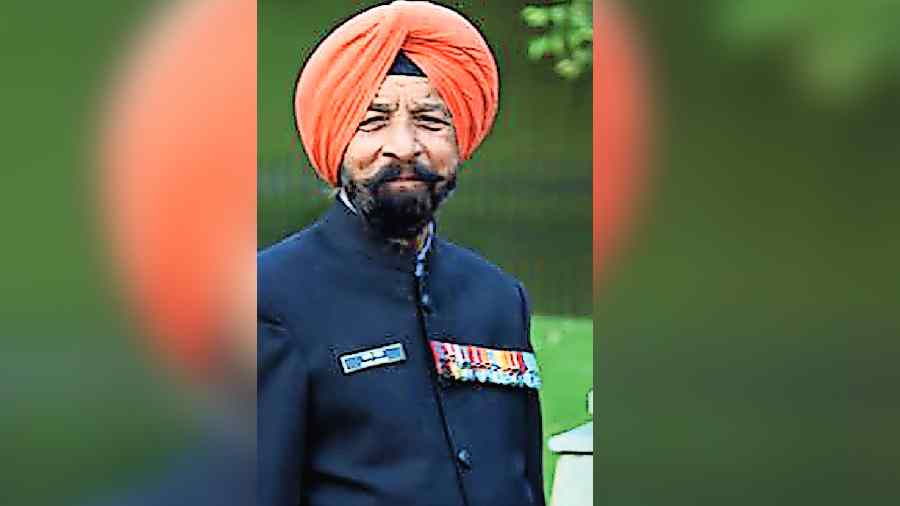Honorary Captain Bana Singh, the only living Param Vir Chakra awardee and an army legend, has said the country would have to “pay a huge price” for the Agnipath scheme, which would “destroy” the military and benefit Pakistan and China.
“The four-year contractual Agnipath scheme will ruin and destroy the Indian Army. It should not have been implemented at all,” Singh, who retired as a subedar major but has been given the honorary rank of captain, told The Telegraph from his home in Jammu.
A tweet from Singh’s handle criticising the Agnipath scheme had created a stir on social media but he removed it after “I started getting phone calls”. He, however, said he would continue to speak his mind: “I shall always speak in favour of the army and its welfare.”
Popularly known as “Siachen hero”, Singh had in June 1987 led an assault on Pakistan’s Quaid-e-Azam post at an altitude above 21,000 feet. The attack killed six Pakistani soldiers and led to the capture of the strategic post.
The post was renamed “Bana Post” and Singh received the country’s highest gallantry honour, the Param Vir Chakra, in 1988. The mission finds mention even in Pakistani defence reviews, which describe it as “bravery beyond comparison”.
Singh, 73, likened to “dictatorship” the way the Agnipath scheme had been sprung on everyone.
“Such radical decisions cannot be taken in a democracy without consulting all the stakeholders and military veterans, who know a lot about soldiering as they have fought wars on the ground. It has never happened before,” he said.
Singh said: “It’s like a dictatorship — like ‘I have taken the decision and it has to be implemented’. It’s might is right.”
Under the scheme, introduced apparently to cut the military’s ballooning salary and pension bills, three-fourths of recruits to the bottom ranks are to be demobbed after four years of service without pension or gratuity.
Young army job aspirants have been protesting across the country, saying recruitment under the scheme would leave them jobless after four years. Retired generals have said the scheme would damage the armed forces’ ethos, professionalism and morale.
“Save the country, Agnipath Scheme will badly damage us, India is going through a crucial Stage. Youngsters are the future of our motherland,” a post from Singh’s Twitter handled had said on Tuesday night.
The post provided a fresh fillip to social media criticism of the scheme. Several military veterans thanked Singh for speaking out on the subject. On Wednesday morning, however, the tweet was deleted.
Asked about this, Singh said: “I had asked my son to tweet it…. I started getting phone calls. So I asked him to delete it. I thought, what is the point when the government has already made up its mind to implement the scheme?”
He added: “It does not matter what one person (himself) says. The whole country needs to say this. The country will have to pay a huge price for it (the Agnipath scheme).”
The government has defended the scheme saying it is meant to lower the average age in the forces, and that the military brass had been thinking about some such measure since the 1980s.
Singh said the Agnipath scheme could benefit India’s enemies. “Soldiering is not a plaything; it comes with years of training. What kind of training will they get in six months?” he said.
“Those who have decided the scheme have no idea about the armed forces. The army cannot be treated like toys. Neighbouring countries like China and Pakistan will take advantage of it. Chinese troops will make further ingress inside our territories.”
In June 1987, the 8th Jammu and Kashmir Light Infantry, deployed in Siachen, found that a large number of Pakistani troops had intruded on the glacier. Flushing them out was necessary but difficult. So, a special task force was constituted and Singh — then a naib subedar — volunteered to join it.
The enemy post was an almost impregnable glacier fortress with ice walls 457 metres high on either side. It gave the Pakistanis the strategic advantage of a clear view of the glacier from their position at more than 21,000 feet — 5,000 feet above the Indian Army battalion headquarters in the area.
Singh took the lead, crawling through the hazardous stretch and closing in on the enemy. Lobbing hand grenades, charging with a bayonet and moving from trench to trench, he and his fellow soldiers succeeded in clearing the post of all intruders.
Singh is invited as a special guest every year to the Republic Day parade and Army Day celebrations as one of the army’s role models.











